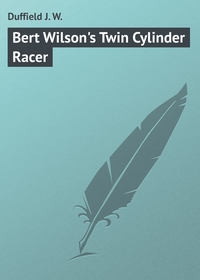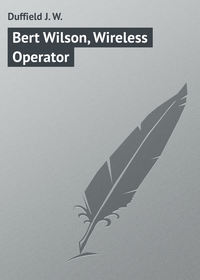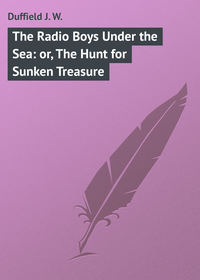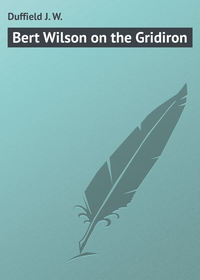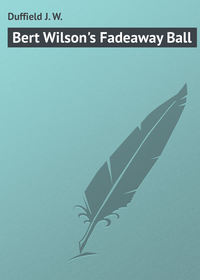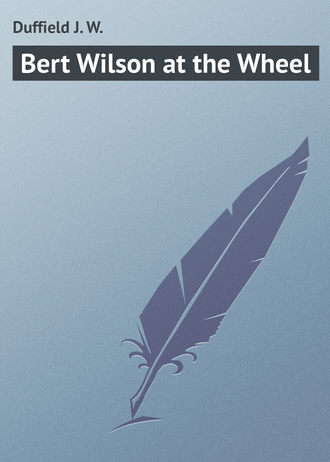 полная версия
полная версияBert Wilson at the Wheel
He swerved the big machine into the ditch, and the wheels bumped and pounded over the uneven surface. The big car fairly shot by the blue machine, however, and amid a triumphant shout from the frenzied boys regained the smooth road and hid the defeated challenger in a cloud of dust.
Then Bert slowed it down a little, but kept well in the lead. The blue machine had evidently given up in despair, however, and gradually dropped back until a turn in the road hid it from their view. The boys broke into an excited discussion of the recent “brush,” and all were enthusiastic in their praise of the staunch old “Red Scout.” They also had many flattering things to say in regard to Bert’s driving, until he was forced to protest that he would have to buy a hat about five sizes larger, as he could fairly feel his head swelling.
Finally the excitement subsided somewhat, and the boys had time to look around them and get their bearings. It did not take them long to find that they were in unfamiliar surroundings. They had gone at such a fast pace that they had covered more ground than they would have believed possible. Bert consulted the odometer, or distance recording instrument, and announced that they had covered almost thirty-five miles!
“Say!” he exclaimed, “we’ll have to do some tall hustling to get back to the camp in time for lunch. We’ll keep on a little way, until we get to a place where the road is wide enough to turn around in, and then we’ll beat it back as fast as possible.”
As he finished speaking, they rounded a sudden turn in the road and a gasp arose from every boy in the car. Not fifteen feet ahead of them was a railroad crossing, and giving a lightning-like glance up and down the track Bert saw that there was a train approaching from both directions. It was obvious that the automobile would not be able to get across in time, and at the brisk rate at which they were traveling, it was equally impossible to stop the machine. It seemed inevitable that the auto would be struck by one or both of the ponderous locomotives, and it and its occupants be crushed to atoms.
The boys turned sick with horror, and gripped the sides of the automobile without being able to say a word. Their eyes gazed without winking at the two rushing locomotives, and they were unable to move.
But Bert saw that they had one, and only one, bare chance of life. He did not try to apply the brakes, which would have been useless and fatal, but as the big auto reached the railroad tracks he wrenched the steering wheel around and headed it directly up the track in front of the northbound train. As he did this he opened the throttle, and bent over the wheel in a desperate and almost hopeless attempt to beat the flying locomotive until the engineer, who of course was using every means in his power to stop his train, could check its momentum and give them a chance to escape.
The “Red Scout” bumped and swayed wildly over the uneven ballasting and ties, and the boys breathed heartfelt prayers that nothing on the staunch car would break. In spite of all Bert could do, the fast express train gained on them, although sparks were streaming from the wheels where the brakes were clamped against them. The engineer had reversed the locomotive, and the great driving wheels were revolving backward.
The momentum of a fast and heavy express train is not a thing to be checked in a moment, however, and the boys in the rear of the automobile could feel the heat from the locomotive boiler.
But the powerful automobile had gotten “into its stride” by this time, and was fairly flying over the uneven roadbed, and to the boys it felt as though it were only hitting the high places, as Frank afterward expressed it. For a hundred or two hundred feet the train failed to gain an inch, and then the brakes began to tell and it gradually fell to the rear.
Shorty leaned over and thumped Bert on the back and yelled: “Slow up, Bert, slow up! We’re out of danger now, I guess.”
Bert glanced back, and saw that Shorty was right. They were drawing rapidly away from the locomotive, so he reduced speed, and the automobile gradually attained a safer pace, and at the first opportunity Bert swung it up off the tracks and onto a country road. This done, he stopped the machine, and leaning on the steering wheel, buried his face in his hands. He said not a word, and the boys could see that he was trembling like a leaf. In a few moments he recovered himself, however, and the boys began to overwhelm him with questions:
“How did you ever think of going up the track instead of trying to get across, Bert?” inquired Frank. “If you had tried to cross that would have been the last of us, because we could never have made it.”
“I did it because it was the only thing to be done, I guess,” replied Bert, in a shaky voice. “I’m no end of a fool to go at that speed on a road that I don’t know, anyway. I don’t know what I could have been thinking of to take such chances. Mr. Hollis will never have any confidence in me again, I guess.”
“Nonsense!” retorted Bob, indignantly. “Why, if Mr. Hollis could have seen the presence of mind you showed, I think he would trust you all the more, if that is possible. Not one person in a hundred would have thought of doing what you did.”
“Yes, but that’s not all of it, by any means,” said Bert, in a mournful voice. “I’ll bet that we’ve broken something on the old car, as well as almost getting ourselves converted into sausage meat. Here goes to look things over, anyway.”
A thorough inspection failed to reveal any break in the mechanism or frame, however, and even the tires were intact. Finally Bert straightened up with a relieved expression on his face, and said: “Well, I can’t seem to find anything at present, that’s one comfort. However, I wouldn’t have believed that any car could stand such punishment and hold together. We won’t kick against fate, though, for not smashing our car for us, will we?”
“I guess not,” agreed Shorty, heartily, “I think we ought to thank our lucky stars that any of us are left to talk about it, even. It’s more than we had a right to expect fifteen minutes ago.”
“I guess you’re right, Shorty, at that,” agreed Bert, “but now, we’d better make a quick sneak back to camp. Mr. Hollis will have given us up for lost.”
Accordingly the boys all climbed into the car, and they were soon humming along on their homeward journey. You may be sure that Bert slowed down almost to a walking pace at every turn they came to, however, and once, just for fun, he said, “Say, Shorty, I don’t like the looks of that curve ahead of us. Perhaps you had better get out and go on ahead to make sure that the coast is clear. I intend to be on the safe side this time.”
Shorty immediately entered into the spirit of the joke, and vaulted out over the side of the tonneau while the auto was yet in motion, and disappeared around the curve. As the auto crept around the bend its occupants could see Shorty waving his handkerchief and signaling for them to come on. Bert laughingly complied, and, as they passed Shorty, stopped a moment to give him a chance to climb aboard. Shorty was soon in his place, and Frank laughed.
“Gee, Bert, that’s being careful for fair. If Mr. Hollis could have seen that I think it would have made up for our going too fast and almost getting smashed up. What do you say, fellows?”
There was a unanimous chorus of assent to this proposition, but Bert did not join in the laughter. He felt in his heart that he had been careless, and he knew that even his subsequent presence of mind in getting them out of a tight scrape did not wholly atone. His mind was filled with these thoughts, when Bob said, “Say, fellows, I don’t see why we have to say anything to Mr. Hollis about our near accident, at all. It will just make him angry at us, and maybe he will not want to let us use the car again. Besides, now that it’s all over, it won’t do him any good to know what a narrow escape we’ve had.”
“No, no, Bob, that would never do in the wide world,” replied Bert, quickly, and in a reproving voice. “The last thing we ought to think of is to deceive Mr. Hollis, and you know it. I’m surprised that you should even have mentioned such a thing.”
“Well, there’s no harm done, is there?” replied Bob, but in a rather shame-faced manner. “We won’t do it if you don’t think we ought to, so there’s no use getting mad about it. I just offered that as a suggestion, that’s all.”
“Well,” replied Bert, “the chief blame for this thing lies on me, anyway, and as soon as we get back to camp I intend to make a clean breast of the whole matter to Mr. Hollis, and he can do as he thinks best.”
“Oh, all right, have it your own way,” growled Bob, sullenly, and they relapsed into silence. By this time it was almost dark, and Bert was forced to drive very slowly, as he had never been over that particular road before. He had a well-developed sense of location, however, and was pretty sure that he was going in the right direction.
As it proved he was not deceived in this, and they shortly struck a road with which they were all familiar. Bert ventured to accelerate their pace somewhat, and it was not long before they came in sight of the cheery camp fire, around which Mr. Hollis and the boys who had not gone on the automobile trip were seated. As they heard the sound of the machine the group around the fire leaped to their feet, and Mr. Hollis walked slowly toward them. When the auto swung into the circle of fire light and came to an abrupt halt, he said:
“What has been detaining you, boys? It seems to me that you are not treating me quite right by going off in this manner and returning at such an hour as this. Why, you should have been back two hours ago.”
A chorus of excited exclamations rose from the boys, but Mr. Hollis raised his hand for silence. When this had been restored, he said, “One at a time, boys, one at a time. Here, Bert, let’s hear your explanation.”
This Bert proceeded to give in a very straightforward manner, and did not attempt to gloss over any of the details of his recklessness, as he was pleased to call it.
Mr. Hollis listened with a serious face, and when Bert had finished, said, “Well, Bert, you were certainly to blame for taking chances in the manner that you did, but, on the other hand, you deserve credit for the presence of mind and courage you showed in extricating your companions and yourself from what might very easily have been a fatal accident. Still, you were right to tell me all about it, and I think that to-day’s experiences may have the effect of making you more careful in the future.”
“You may be sure, sir, that I will never be so careless again,” promised Bert, and by the tone of his voice, Mr. Hollis knew that he meant it.
It was a hungry lot that sat down to supper that evening, and little was spoken of except their thrilling experiences of the day. After supper, however, they began to feel the effects of the exciting day, and all expressed themselves “tuckered out.” As Frank said, “He felt too tired to take the trouble of going to sleep.”
They all managed to overcome this very important objection, however, and soon there was no sound to be heard in the camp except the rustling of the embers in the camp fire as they slowly burnt themselves out and settled into ashes.
CHAPTER XV
Mountain Scouting
Sunshine! glorious, golden sunshine! Was ever sunshine more bright? Was ever sky more blue? Was ever day more beautiful? So questioned our campers as, fresh and glowing from a cold plunge in the lake, a hearty breakfast despatched, bedding aired and cots freshly made up, camp cleared up and morning duties all attended to in tip-top fashion, they mustered about Mr. Hollis to receive the day’s commissions.
It mattered little what might be the commission allotted to each squad. Anything, everything that might come to them in the way of camp duty, could not but be a pleasure on such a glorious day as this. With young bodies aglow with health, young minds, awake and alert for all new impressions, young hearts filled with desire to live right, to do right, to be kind and helpful to all with whom they came in contact, how could they help being happy?
The camp was full of merriment, but perhaps the happiest squad of all was the auto squad. In fact this was always the case, but today the autoists had a special expedition. They were to play the mountain scouting game, and as the nearest mountains were at a distance from camp the squad had been detailed for the automobile.
Gaily the fellows piled in and away they flew. As the roads which they must travel today were rough, their progress was much less rapid than usual; but, despite this they reached their destination in about half an hour.
“Hurrah for the ‘Red Scout,’” cried Bob, as they tumbled out of the car. “If she can travel like that over these roads, what’ll she do on the race track? Oh, say, fellows, the ‘Gray Ghost’ won’t be in it. She’ll fade away like a real ghost.”
“Don’t I wish the day of the race was here,” said Tom. “Seems as if it would never come, doesn’t it, fellows?” and “It sure does,” they all chorused.
The “mountains” were really very high, rocky hills, but, as they were known to embrace many very steep and dangerous ravines, some of them nearly as perilous as mountain precipices, many and earnest had been the warnings given by Mr. Hollis as the boys had started on their expedition, and each boy carried in the pockets of his jacket some part of the equipment for first aid to the injured that was a part of the camp outfit. Thus safe-guarded, they felt no fear.
As soon as they had arrived the three “hares,” who had been coached in the game, went to hide themselves in the mountain, and, after sufficient time had been given them for this purpose, the “hounds” followed them; while Bert and Dave Ferris remained in the auto to watch for any signal that might be given them from the mountain.
The game of mountain-scouting consists in the “hounds,” who must stay within certain limits of ground, finding or “spotting” the “hares” within a given time. If they find or spot them even with field glasses, it counts, provided that the finder can tell who it is he has spotted. The hounds write down the names of any of the hares that they may see. If at the end of the allotted time no hare has been spotted, the hares win.
To-day two hours had been the given time and the boys in the mountains were to signal to Bert the news as each hare was found.
Time was nearly up. Three hares had been found. The chase had been a merry one and now hares and hounds together, no longer pursuers and pursued, but just happy-hearted campers were hiking down to the two in the automobile.
The return signal had been given, and Bert and Dave, relieved of the slight anxiety they had felt while the game was going on, expected each moment to see the boys come into view.
Suddenly Dave sprang to his feet. “Look, Bert,” said he, “another signal.”
Breathlessly the boys read the signal wig-wagged to them from a point high up on the side of the hill. “Come quick! Fred hurt. Bring splints and kit and ropes.”
It took only a very short time for the boys to reach the scene of the accident, and one glance took in the situation. Turning a corner the boys had come, all unknowing, upon a spot where the rocks shelved suddenly down into a deep ravine. The edge of the descent was hidden by a fringe of breast-high bushes, and Fred Morse, all unconscious of his danger, had stepped upon a piece of rock which gave under his foot, and, before the boys could even put out a hand to save him, had slipped through the bushes, and the horrified boys had heard their comrade go crashing through the bushes on the side of the ravine. His frightened cry, “Help, fellows, I’m falling!” still echoed in their ears. While two of the boys were signalling, the others had called to Fred but no reply had come back to them. When Bert reached them, Bob was running along the edge of the cliff, in great danger of going over himself, in a vain effort to find a place to climb down.
Now, not waiting for the call for volunteers, he ran to Bert and begging him to hurry and help him, began fastening the ropes about himself. In a twinkling, the rope was adjusted, the knots securely tied, and the rope firmly held by four boys, Bob was lowered slowly and carefully over the side of the cliff.
Down, down he went till, just as the boys began to fear that the rope would not be long enough, it lay slack in their hands, and they knew that Fred was found. Presently came the signal, three distinct pulls on the rope, and soon poor Fred was lifted tenderly over the edge and laid gently down. A few minutes more and good old Bob was back with them.
Now, all attention was turned to Fred. After a careful examination from head to toe, Bert relieved the anxious fears of his comrades by the announcement that he was sure that Fred’s life was not in danger. A faint cheer went up, which faded when Bert said Fred’s leg was broken.
Consternation filled their hearts, for the nearest doctor was miles away, and though Bert felt sure there was no more serious injury than the broken limb, it was hard to tell what internal injury might have been sustained, and a long ride in the motor with the leg in the present condition might prove a serious matter. There was no doubt about it, the leg must be set at once.
Not one of the boys had anything but the simplest knowledge of first-aid-to-the-injured, but, though at first hearts feared and hands trembled, they conquered fear and each boy went steadily to work to do his part. Whether it was to hand the cotton batting or to pull with full strength upon the poor broken limb, or hold the splints while Bert wound yards of bandage around them, not a boy flinched, and at last the work was done, and well done.
Then with faces scarcely less white than Fred’s own, they turned to the task of making a litter on which to carry him down to the motor.
After a long search, for the hill was almost barren of trees, being covered mostly with scrubby bushes, two short and two long saplings were found and, laying two of the boys’ jackets on the ground and running each of the long poles through the sleeves of a jacket, the two jackets were buttoned together with buttons down. Then the short poles were lashed on and a comfortable stretcher was ready to their hand.
In the auto on smooth roads, carried tenderly by his fellows over the rougher places, they at last reached the office of the crusty old village doctor and laid Fred on the couch for the doctor’s examination. But though the doctor was crabbed, he was skilful, and in a very short time the temporary splints were replaced by permanent ones and the party turned toward camp.
Homeward-bound in the auto at last, the boys drew a great sigh of relief and weariness. What an eventful day it had been! Begun so brightly, it had nearly ended in a tragedy, and at the thought their hearts swelled with gratitude that they were taking dear old Fred home with them alive, and, if not well, at least only the worse for a broken leg and some severe bruises. They could not be thankful enough.
“Who’s that going along the road ahead?” asked one of the boys, and all saw, walking in the middle of the road and directly in the path of the motor, a little bent old woman’s figure, the most conspicuous article of whose dress was a bright red, very draggled looking feather which drooped from the brim of a very ancient hat.
Very tired and pathetic, the old figure looked to the boys as they brought the machine to a stop beside her, and the old wrinkled face, wet with tears that was turned to them when they spoke to her, made every warm boy’s heart ache with pity.
“Why it’s Kitty Harrigan’s old mother, who has just come over from Ireland,” said Dick, in a low voice. “Don’t you remember, fellows, how we laughed when Mr. Hollis told us about her the other night? He said, you know, that the poor old lady had been quite a village belle in her young days, and now, in her age, she imagines herself back in her girlhood. Look at her now.”
Indeed, the old lady was a study, for no sooner did her old eyes fall on Bert’s handsome face as he spoke to her, than tears were brushed hastily aside, and with a coquettish glance from her brown eyes that, despite the years, were still bright, she made him so deep a curtsey that her long black coat swept the ground.
She had eluded all watchful eyes, and slipped off by herself for a walk, and when she wished to return, had taken the wrong direction, and was walking away from home instead of toward it. She had enjoyed herself immensely at first, making the most of her seldom-obtained freedom, but now her old feet were very tired and the old limbs that had carried her sturdily for nearly ninety years were growing weak at last, and, after such unusual exertion, were trembling beneath her.
At the boys’ proposal to take her into the car and give her an automobile ride, the tired old face broke into a smile, and, as the boys settled her in the most comfortable seat in the tonneau, she leaned back luxuriously, and, clasping her old hands, said in ecstasy, “Did annybody iver see the loike of Biddy Harrigan ridin’ in an artymobile, no less.” She beamed upon the boys, she patted the hands and shoulders of all of them within her reach, and in her rich Irish brogue showered compliments upon them; for a very demonstrative creature was old Biddy Harrigan. She did not notice that mischievous Bert, whom she had called a “rale foine gintleman,” took advantage of her flow of talk to sing in a very low tone, “‘H-a-double r-i-g-a-n spells Harrigan’,” but the boys found it very hard to keep their faces straight.
On Fred’s account, poor Fred, who had, perhaps, shown more courage than anyone else in that day’s ordeal, for not one word of complaint had he uttered through all his pain, the boys felt that they must go on to the camp where he could get the rest and attention he so sadly needed. They did not know that what was causing him keener anguish than the physical pain was the fear that he would be unable to be on hand on that day of days which he, like every other fellow in camp, had thought of every waking moment, dreamed of every night and looked forward to with daily-increasing impatience – the day of the race between their adored “Red Scout” and the challenged “Gray Ghost.” To miss seeing the “Red Scout” come in gloriously victorious (not a single doubt of her victory entered any boy’s mind), what was the pain of a broken leg to the misery of that possibility! But they did know that he needed care, so they carried Biddy Harrigan with them. As supper was ready when they reached camp, they placed Biddy in the seat of honor and regaled her with the best of the camp fare.
Never had an old women enjoyed herself so much. She could not get over the fact that the delicious supper had been cooked by boys. “If Oi hadnt of seen it and tashted it, Oi niver, niver would have belaved,” she said over and over again.
After supper they hurried the old woman, gesturing and exclaiming at the delight of another “artymobile” ride, into the auto and soon had her home.
Irish Kitty, who washed for the camp, was overjoyed at her old mother’s safe return and overwhelmed them with gratitude.
The boys last view of Biddy was a grateful, curtseying, waving, delighted old woman who repeated over and over again, “O’ll not forgit yez, B’ys, O’ll not forgit yez. Yez’ll hear from old Biddy agin,” and they did.
CHAPTER XVI
By a Hair’s-Breadth
Tap, tap, tap, tap – tap, tap – tap, tap, tap – sounded in Ben’s ears before he was fully awake and conscious. He sat up in bed and listened, and asked himself what that sound was. Was it rain? At the thought his heart grew heavy with apprehension. Rain on this day, when he and Bert and Tom were going to auto ten miles over to the Red River for a day of trout fishing. The other fellows, who did not care so much for fishing, were going on a tramp with Mr. Hollis, and he and his chums were to have the auto all to themselves the whole day.
Slipping noiselessly from his cot, he lifted the tent flap and stepped outside. The first rays of morning sunshine beamed full in his face, and the insistent noise that had aroused him proved to be the tap-tapping of an energetic woodpecker out for the proverbial “early worm.”
Delighted at the prospect of such a glorious day, he rushed back into the tent with a hop, skip and a jump, at sight of which Don, always ready for a frolic, began frisking about and barking joyfully.


